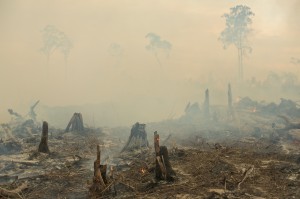On the first day of the Roundtable on Sustainable Palm Oil (RSPO) Pak Jamaluddin was quiet. He said the air conditioning of Kuala Lumpor gave him the flu. He seemed lost among the groups of palm producers, with their Blackberries and dark suits.
Exhausted from the canoe rides, bad roads, the concrete maze of Jakarta, and the foreign environment of a Kuala Lumpor convention hall, I found Pak Jamaluddin on the second day of the RSPO outside, sitting cross legged on the sidewalk. He waved me over, and I sat with him. He leaned over to me as he whispered: “It is over. Our forest is gone. Duta Palma has flattened the last of it. We are finished.”
A few months before, I visited with Pak Jamaluddin in his village of Semunying Jaya. Deep in the interior of Borneo, his village had become a hotspot of rainforest destruction and human rights abuse at the hands of the palm oil producer Duta Palma.
[youtube 5-jqRVOwBJQ]
A Dayak community, Semunying Jaya’s residents had survived for centuries hunting forest pigs and gathering valuable honey, resins, and rattan, which they sold to Malaysian traders that would visit their village.
When I arrived in July, Pak Jamalludin was outspoken, angry, and in the midst of a brutal struggle to hold on to the last of his community’s traditional forest. Almost all of the rainforest surrounding Semunying Jaya had been flattened and burned by Duta Palma. Targeted by the company, Pak Jamalludin was jailed for his efforts to present his community’s case to the company and government. But the remaining rainforest gave Pak Jamaluddin hope, and he tirelessly tried to save it. Motivated by his struggle, I wrote a case study about his community’s case and shot a short film.
Pak Jamaluddin had traveled to the annual meeting of the RSPO in Kuala Lumpor to meet with Duta Palma, and ask for them to respect his community’s right to Free, Informed, and Prior consent, and compensate Semunying Jaya for the destruction of their culture, livelihood, and future. But, reflective of their complete disrespect of RSPO member responsibilities, Duta Palma did not send a representative to the meeting.
Sitting on the cement, with no Duta Palma representatives at the RSPO and the last of his community’s forest destroyed for oil palm, Pak Jamaluddin did not have any struggle left in him.
David Gilbert is a Research Fellow at RAN. He has worked in the tropical forests of the Amazon and Indonesia, with a special focus on forest conservation and indigenous rights. He can be reached at davidgilbert@ran.org
